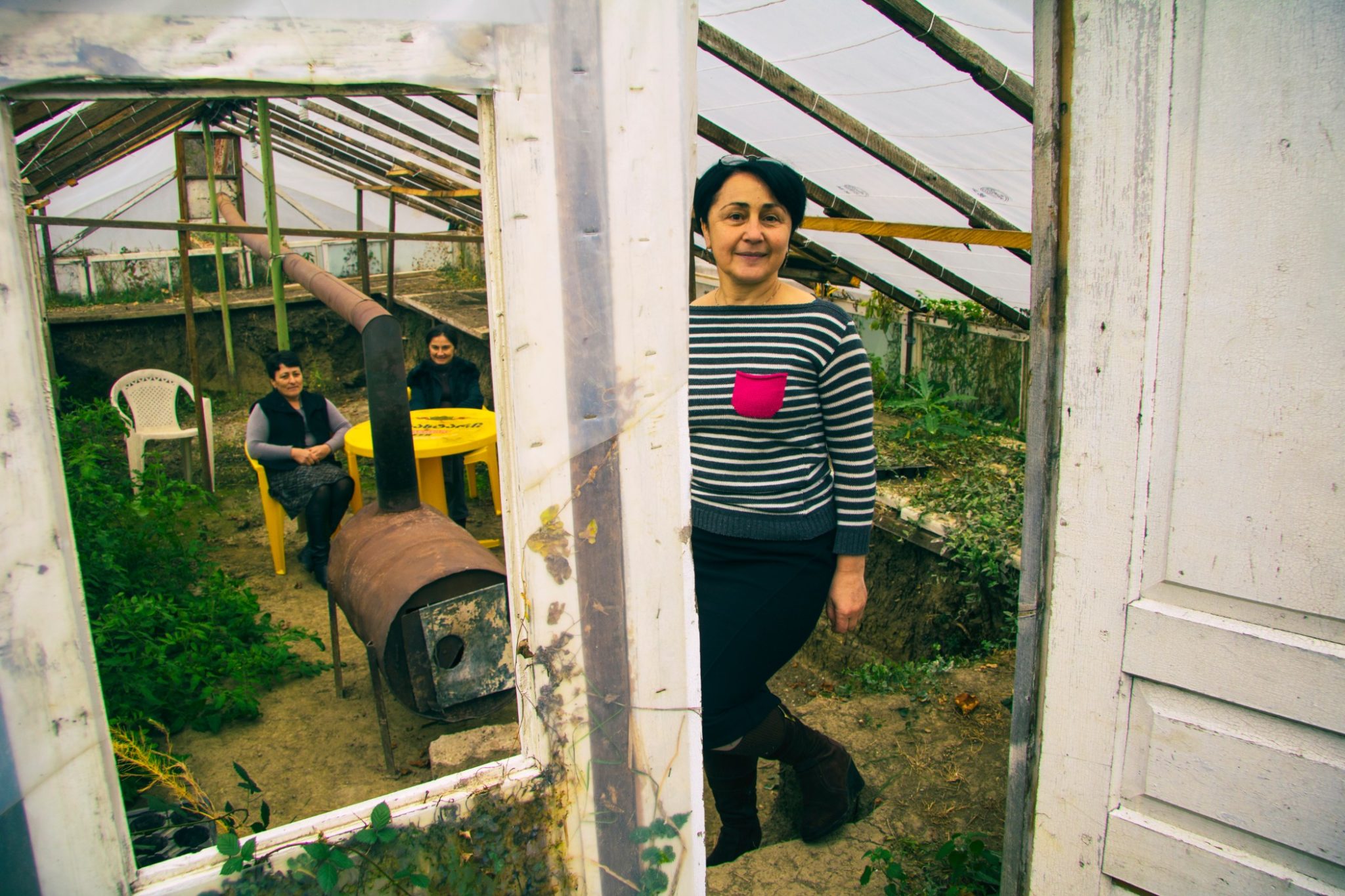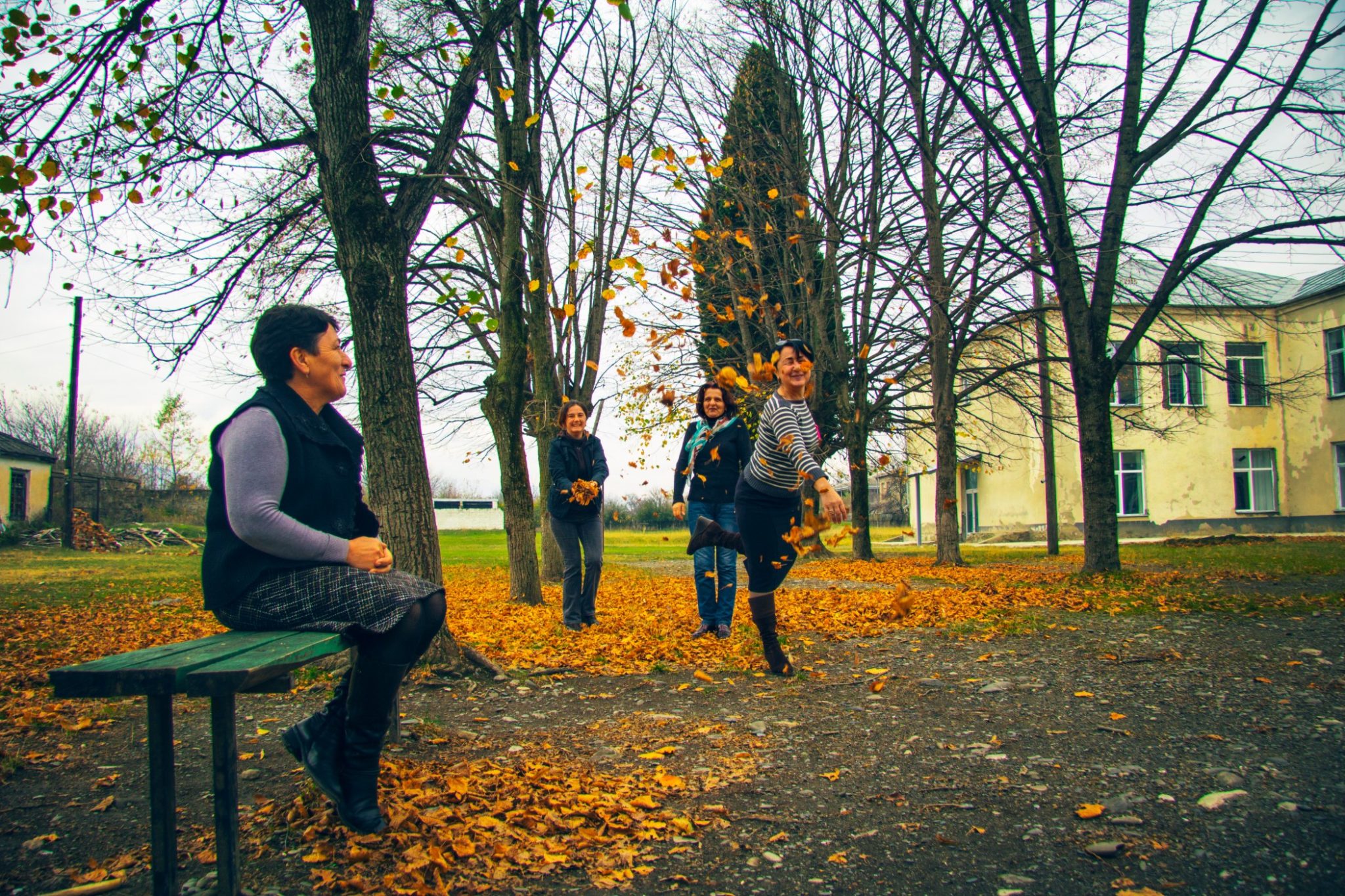Dali Veshaguridze, 52, Zemo Alvani
„I worked in a public school in the village of Zemo Alvani as an accountant first and then as a procurement specialist. The teachers are usually done with their work at 2 or 3 p. m., however, the administrative staff has to stay in the school until 5 p. m., and have lunch at workplace. It so happened that once our colleague Tina brought home-grown tomatoes to lunch, and Sopo who is so skilled she will grow anything from the ground, shared vegetables from her own garden. The idea of starting up an agricultural cooperative originated at our lunchtime. As we had good experience in farming, we decided to register a cooperative, launch a cucumber and tomato business and seek grants. It would increase our revenue and allow us to hire additional people and develop our business.
 So, we, five women, joined forces to start a cooperative, and brought our husbands in the business. From the internet, we found out that there were actually grants available for agricultural financing and decided to try winning them. We all participated in writing the project: where we needed to write an essay, we engaged the teachers of the Georgian language, I helped with accounting and tables. We didn’t know how to write a business project. We simply answered the questions in the questionnaire. Then we received feedback from the donor and overall it took us a year and a half to complete the project. Thankfully, the donors realized that we had no experience in business plans and did not immediately block us, gave us a chance to improve. Sometimes the donors would visit us, train us and help us submit a perfect project. They trained us right here, at school. Imagine working from 9 a.m. until 5 p.m. at school, then returning home and doing chores until children go to bed at 10 p.m. Only after that, we started working at the project. We, that is, the cooperative members, would sometimes even stay up all night, writing the project. We would gather at Shorena’s place (she’s also a member of our cooperative) and finish work at 4 in the morning. We slept 4 hours and at 8 a. m. we had to be wide awake to prepare our children for school and go to work. This is how we lived for more than a year. The project was the product of ours, the women only; sometimes we would ask our husbands for opinion, mostly about machinery and irrigation system technologies, but the vision, the idea was ours. I even remember men looking at us dubiously, telling us we were wasting our time and we did not stand a chance of winning the project. They did not have trust in us. Men are not as open to change as women are because we are constantly searching for new solutions. They did not expect us to get any funding and wondered why we would deprive ourselves of sleep. At last, we submitted a 40-page business plan to the donor. Our plan was designed for a 3-year development. According to our forecast, we faced risks for the first two years, and in the third year we were to start earning profit. We were asking for 85,950 GEL to build a greenhouse for cucumber and tomato; of this amount, we co-financed 22,000 GEL. We, the female members of the cooperative, took credits based on our salaries and the donor helped us set up a greenhouse. By the way, as soon as our men saw that we got the funding, they stood by us right away, and cleaned the land for the greenhouse. Currently, we have two greenhouses. We call them twins, together they hold 900 square meters of land where we grow up to 1,200 tomato and cucumber plants.
So, we, five women, joined forces to start a cooperative, and brought our husbands in the business. From the internet, we found out that there were actually grants available for agricultural financing and decided to try winning them. We all participated in writing the project: where we needed to write an essay, we engaged the teachers of the Georgian language, I helped with accounting and tables. We didn’t know how to write a business project. We simply answered the questions in the questionnaire. Then we received feedback from the donor and overall it took us a year and a half to complete the project. Thankfully, the donors realized that we had no experience in business plans and did not immediately block us, gave us a chance to improve. Sometimes the donors would visit us, train us and help us submit a perfect project. They trained us right here, at school. Imagine working from 9 a.m. until 5 p.m. at school, then returning home and doing chores until children go to bed at 10 p.m. Only after that, we started working at the project. We, that is, the cooperative members, would sometimes even stay up all night, writing the project. We would gather at Shorena’s place (she’s also a member of our cooperative) and finish work at 4 in the morning. We slept 4 hours and at 8 a. m. we had to be wide awake to prepare our children for school and go to work. This is how we lived for more than a year. The project was the product of ours, the women only; sometimes we would ask our husbands for opinion, mostly about machinery and irrigation system technologies, but the vision, the idea was ours. I even remember men looking at us dubiously, telling us we were wasting our time and we did not stand a chance of winning the project. They did not have trust in us. Men are not as open to change as women are because we are constantly searching for new solutions. They did not expect us to get any funding and wondered why we would deprive ourselves of sleep. At last, we submitted a 40-page business plan to the donor. Our plan was designed for a 3-year development. According to our forecast, we faced risks for the first two years, and in the third year we were to start earning profit. We were asking for 85,950 GEL to build a greenhouse for cucumber and tomato; of this amount, we co-financed 22,000 GEL. We, the female members of the cooperative, took credits based on our salaries and the donor helped us set up a greenhouse. By the way, as soon as our men saw that we got the funding, they stood by us right away, and cleaned the land for the greenhouse. Currently, we have two greenhouses. We call them twins, together they hold 900 square meters of land where we grow up to 1,200 tomato and cucumber plants.
Our first year yield of cucumber was 4 tons, it could have been as much as 15 tons, but our ambition is to produce bioproducts. Our cucumbers need no washing and we use not chemical but biologically clean fertilizers. Bioproducts do not usually have a large yield. The first year, our sales revenue was 6,000 GEL and we reinvested this amount: we built a gas pipeline, bought organic fertilizers for the whole year and, because we were short of water, bought a water tank on Amazon. We paid for the 5-ton tank 250 GEL, which would have cost us 1,200 GEL in Georgia. We still need various equipment such as heating system and a generator so that our crops survive in frost or during power outages.
 I think we are growing along with the cooperative. Do you know what it is like to live in a rural area? Once you are born in a village, you will find out that all your life has been a slow journey to the village cemetery. But it’s not like that anymore: we, women lead an active life, we see the entire Georgia, go on learning tours. Our self-confidence has improved too. For instance, Sopo, a member of our cooperative, went to the village shop and the shop assistant asked: “Aren’t you the girl from the greenhouse?” We have become recognizable. We risked, and it kind of worked out. We now rely on each other and our grey life has gained colors: when the school year is over, then another life begins for us, the one more vigorous and interesting.”
I think we are growing along with the cooperative. Do you know what it is like to live in a rural area? Once you are born in a village, you will find out that all your life has been a slow journey to the village cemetery. But it’s not like that anymore: we, women lead an active life, we see the entire Georgia, go on learning tours. Our self-confidence has improved too. For instance, Sopo, a member of our cooperative, went to the village shop and the shop assistant asked: “Aren’t you the girl from the greenhouse?” We have become recognizable. We risked, and it kind of worked out. We now rely on each other and our grey life has gained colors: when the school year is over, then another life begins for us, the one more vigorous and interesting.”

